How did Zimbabwe get here? What is going on? What is likely to happen? The short answer is a combination of short-term factors, and long-term trends, economic structural pressures, political policy choices, and personal power agenda.
Read this extract from Robert Mugabe, forthcoming book by Sue Onslow and Martin Plaut (Ohio University Press, 2018)
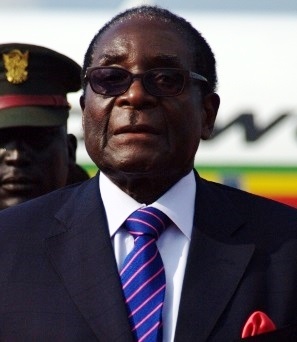
Robert Mugabe
The Zimbabwe Global Political Agreement (GPA) which shared power between the parties between 2009-2013 allowed ZANU-PF the space to regroup: in the narrowed political arena of decision makers, Mugabe politically out-manoeuvred the Government of National Unity, Prime Minister, Morgan Tsvangirai. The President appointed more ministers than originally agreed (41, rather than the originally agreed 31), along with leading civil servants, diplomats, the Attorney General, the Governor of the Reserve Bank and the Police Commissioner. While his party re-energized its grass roots organisation and support, ZANU-PF kept control of the security services, as MDC squandered its access to power and remained fatally divided between two rival factions. But this pact with the opposition came at considerable costs to party unity.
Since 2000 there had also been a process of ‘creeping coup’ of the militarization of the administration of the country, as the securo-crats were absorbed into the upper echelons of decision-making. In Paul Moorcraft’s view this fusion of political and military power within ZANU-PF has long been the key to Mugabe’s political longevity. However, it is not simply that Mugabe calls the shots, or that ZANU-PF dominated the security sector. Zimbabwe under Mugabe is the epitome of a neo-patrimonial state.
This is not a system dominated and dictated by the personal whim of one man, exercising power through an informal system of rule. It incorporates a particular set of power relations with the trappings of a more liberal institutional system – Parliament, the judiciary, and a constitution. Therefore, power is not simply concentrated in the President’s office. Mugabe was now woven in a matrix of corrupt economic, political and military networks, a veritable web of co-dependency. He held the uneasy balance between the squabbling and increasingly hostile factions within his party. Norma Krieger has argued ‘the different factions within ZANU-PF [were] held together chiefly by a shared vested interest in preventing the ‘opposition‘ parties in the [GPA], and in particular, MDC-T (Tsvangirai) from coming to power as a result of democratizing reforms’. Furthermore, during the Global Political Agreement, ZANU-PF moved from formal domination of state institutions, to informal and parallel structures, as Mugabe and the party concentrated on the business of being re-elected, using the state media-scape to portray MDC as out of touch. No wonder Tsvangirai was outmanoeuvred.
After their surprising defeat in the July 2013 elections, the deeply divided factions of MDC appeared essentially irrelevant. The battle within ZANU-PF over who was to succeed Mugabe began in earnest. This was a no-holds-barred contest. Indeed, this factional infighting is strongly reminiscent of the ZANU movement in the liberation period. Vicious personal politics also entered the picture in the form of Mugabe’s second wife, Grace. Whereas in the 1990s Grace Mugabe had not taken a prominent political role, this now dramatically altered. For the past decade she has been gatekeeper of Mugabe’s diary, and so one of the key controllers of access and flows of information reaching the elderly President. (This should not be pushed too far: Mugabe has his own sources of information, through military intelligence.)
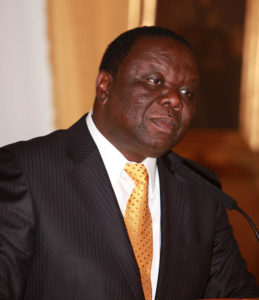
Morgan Tsvangirai
By early 2016, party internecine struggles reached such a pitch that observers were warning the country risked descending into civil war. The principal contenders both had impeccable revolutionary hero credentials: Joice Mujuru, wife of the former ZANLA commander and leading Zimbabwean business entrepreneur, General Solomon Mujuru, and the then-Minister of Justice Emerson Mnangagwa. As former Minister of Defence, Mnangagwa had maintained excellent connections to the security forces and intelligence services, and the Karanga, who want ‘their turn to eat’, to use the Kenyan expression. At independence, Joice Mujuru was the youngest Cabinet member, and held continued office until her appointment as Vice President in 2004, a move that appeared to anoint her as front-runner to succeed Mugabe. However, Mujuru’s power base was dramatically undercut by her husband’s mysterious death in 2011.
She then fell foul of Grace Mugabe who had contrived her own appointment in 2014 as head of the influential ZANU-PF Women’s League (a position previously held by Sally Mugabe, and one which also put her in the Politburo). Grace Mugabe then used this platform to launch a series of vituperative attacks on the Vice President. These increasingly lurid accusations included witchcraft (a powerful accusation in traditional Shona culture) and attempts to poison her husband. In the Harare rumour mill, there were tales of ‘bugged conversations and secret videos showing the vice president in unseemly attire, [and] whisperings of hit men hired in Israel and South Africa.’ Unlike her husband who has long been known for his subtle ambiguous barbs as he verbally pulverized opponents, Grace Mugabe did not pull her punches. (The irony of President Mugabe conferring PhD degrees on both women at the same ceremony at the University of Zimbabwe in September 2014 was not lost on the audience. However, unlike Grace Mugabe, there was no doubt that Mujuru had earned hers.) While Mugabe stayed quiet, the state-run media amplified the First Lady’s accusations.
A distinct pattern emerged of vicious infighting, verbal public brawling leading to Mugabe’s pronouncements calling for an end to the war, and endorsement at the annual ZANU-PF Congress of the senior party line-up. In the meantime, Mugabe regularly reshuffled the cabinet. In 2015 it was enlarged to over 72 ministers, ‘each of whom receives large salaries and allowances, vehicles, housing, and special staff.’ The ZANU-PF internecine struggle culminated in Joice Mujuru’s summary dismissal from Cabinet and expulsion from ZANU-PF in April 2015. This was accompanied by a purge of seven other Mujuru supporters from Cabinet, along with powerful provincial officials. Defiantly, Mujuru founded a new political party, Zimbabwe People First (ZPF) and took her arguments to the diaspora and international audiences.
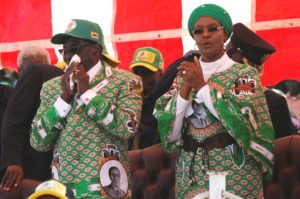
Grace and Robert Mugabe
Speculation around Grace Mugabe’s own presidential pretentions roiled on. Initially, it was not clear whether she was personally politically ambitious, but there was no doubt around her determination to protect her substantial property and financial portfolio in Zimbabwe, Dubai and the Far East, and her children’s inheritance. This meant she retained a powerful emotional lever over Mugabe in his supposed responsibilities as a father, as well as her own survival instincts. Back in 2013 Zimbabwean war veterans scoffed ‘power cannot be sexually transmitted’. Two years later hints of her possible ambitions excited a storm of media interest, as she was reputed to have support among a younger generation in the Politburo and among provincial officials, known as Generation 40 or G40.
Of these, the most significant was Saviour Kasukuwere (former Minister of Youth Development, Indigenization and Empowerment [2009- 2013], Minister of the Environment ([from 2013- 2015, and then Minister of Local Government). Kasukuwere had his own political ambitions, and as a former Minister for Youth Development, had strong links with ZANU-PF youth structures. (Grace Mugabe’s previous vocal supporter, Jonathan Moyo, former university professor, Minister of Information and master of political propaganda, who has the unique if dubious record of joining, then leaving ZANU-PF twice, is now widely discredited.) The ‘Million Man March’ in May 2016 – with its waving banners of ‘Vote Comrade Mugabe: This is the final battle for total control’, and its posters reading ‘We Love Our Mother’ above images Grace Mugabe – mobilized ZANU-PF youth brigades around G40, rather than the war veterans. As the experienced Zimbabwean analyst, Brian Raftopoulos pointed out, ‘The absence of employment alternatives for youths makes them extremely vulnerable to such mobilisation by various party structures’. It was a blatant political statement of the street, to prepare the ground for the 2018 elections.
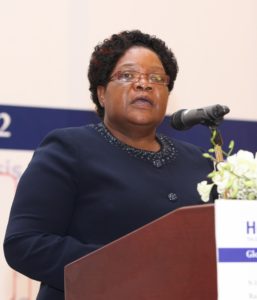
Joice Mujuru
From 2000 Emmerson Mnangagwa’s own fortunes fluctuated markedly. A fellow veteran of the liberation movement with impeccable struggle credentials, he too left ZAPU for the newly formed ZANU in 1963, and had led the first group of ZANLA cadres to China to be trained in sabotage techniques. After finishing his military training, Mnangagwa returned to Tanzania in May 1964, where he and other returning ZANU guerrillas formed the Crocodile Gang. Mnangagwa was captured after blowing up a railway train in Rhodesia, and only narrowly escaped the death sentence. The Rhodesian authorities mistakenly thought he was under 16, although Mnangagwa was about 21 at the time. He spent ten years in jail and was released in 1974 as part of the ‘unity talks’ amnesty. In Mozambique, he was elected Special Assistant to the President at the 1977 Chimoio congress – which meant he was the military and civilian representative of the party. He also accompanied Mugabe to the Lancaster House negotiations, and as Minister responsible for the intelligence services in the post-independence government.
Mnangagwa served in every cabinet until he lost his constituency seat to MDC in the 2000 election. He was brought back by Mugabe to be speaker of Parliament. In 2014-5, he seemed to be complicit in the First Lady’s coarse but effective crusade against Joice Mujuru, and in 2014 Mugabe appointed him Vice President, following Mujuru’s dismissal.
However, the alliance of convenience between ‘the Crocodile’ and the First Lady then descended into another toxic and highly public struggle, with press reports of mysterious burglaries of Mnangagwa’s office and intimidation of his supporters within ZANU-PF. His supporters within the party and its provincial structures were nicknamed ‘Team Lacoste’ (which gets its name from the American designer label and even uses its crocodile motif.) In 2016 there were street brawls between rival youth brigades supporting the Mnangagwa and Grace Mugabe/Kasukuwere factions. Furthermore, Central Intelligence Organisation agents were reported to be watching the movements of current and former ZANU-PF elites on Mnangagwa’s behalf. Intelligence officers also continued to threaten opposition leaders. As a member of the Karanga community, Mnangagwa was firmly opposed to Zezuru dominance within ZANU-PF. He and other Karanga ZANU-PF politicians remained determined to prevent a Zezuru succession which would limit their access to state assets. This was a key factional issue within the party.
As the international community quietly positioned itself for life-after-Mugabe, diplomats feared the possibility of a violent factional struggle amid renewed economic meltdown. In this apocalyptic view of Zimbabwe’s future, Mnangagwa was seen as a pragmatist and technocrat who could draw together a government of all talents (perhaps wishful thinking by Mugabe’s many opponents in the international community and the Zimbabwean diaspora). Crucially, Mnangagwa enjoyed excellent links within the security forces hierarchy, and among the war veterans. In 2016-2017 it was increasingly apparent he had taken over the day-to-day management of Politburo meetings and Cabinet discussions, to the evident boiling frustration of his rivals who publicly accused him of disrespect of ‘The Boss’ and, in front of Mugabe, called for him to be fired. Matters reached a crisis point in November 2017, when Mnangagwa was summarily dismissed as Vice President and Minister of Justice, and suspended from the party structures. The other critical political development in the run up to the ZANU-PF annual party congress was Grace Mugabe’s unashamed campaign to be appointed as Vice President, on the grounds that the ZANU-PF constitution specified one VP should be a woman. She had also begun a crude public campaign to position Sydney Sekeramayi, Minister of Defence, as Mugabe’s successor-in-waiting.
International commentators were left reeling. Was this the death knell of Mnangagwa’s leadership campaign, or had the crocodile ‘retreated into the reeds’, confident in the knowledge of those links within the security services and the war veterans association? As the Zimbabwean economy looked likely to plunge into another period of instability, spiralling prices and social distress, Mugabe’s government’s ability to pay the salaries of junior army officers and the police was also going to be in the mix. At first, early excited talk of a possible putsch unravelled into more careful assessment that dissension in the security forces would more probably play out through ‘score settling, assassinations and small mutinies’. Mugabe has long taken considerable care to ensure the loyalty of key appointments within the security forces hierarchy, personally vetting every appointment above the rank of major; and his presidential guard remains the most highly trained in the country.
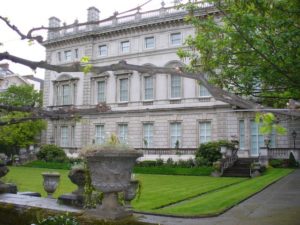
Lancaster House
There was one certainty: Mnangagwa, the famously tough politician and ruthless strategist – he once repeatedly punched a fellow ZANU-PF Cabinet minister, to ‘discipline’ him – would not go down without a fight. Mnangagwa had always been extremely careful to underline publicly his political loyalty and personal indebtedness to Mugabe, and his loyalty to the party. The fact that he was the leader of the Crocodile Commando, claiming to be the first ZANU guerrilla group to kill a white farmer, enhanced his standing as a legitimate struggle hero. International actors had been encouraged by his collaboration with Finance Minister Patrick Chinamasa’s declaration that ‘Zimbabwe must be a country which pays its debts’. (After a lot of intra-ZANU-PF infighting over the interpretation of ‘indigenization’ policy, a more pragmatic approach had finally been adopted to soothe the sensibilities of potential international investors)
Then, in yet another reshuffle, Mugabe reconfigured the political chessboard, demoting Mnangagwa’s Politburo allies, including the Finance Minister.) Immediately after his own dismissal, Mnangagwa abandoned his usual caution. In an appeal formally directed to Mugabe, but clearly aimed at wider party activists, he urged for people ‘’to determine for themselves who between the three of us including your wife and the notorious G40 boys is the enemy of the party and who the real culprit is in destroying our beloved ZANU-PF”. Then came a rare public warning from the head of the Zimbabwean Army, General Constantino Chiwenga, for the ‘purge’ within ZANU-PF to stop, or the army would step in. After a day of frenzied social media speculation and denial, came the news of the Zimbabwe Army chiefs following Rule No 1 of how to launch a successful coup: seize the radio/TV station. Rule No: 2, for national liberation armies and their unique relationship with the party political leadership: declare this action to be in the name of the Party and the People. It was a palace coup, a Shakespearean power-play, reminiscent of the barons removing an over-mighty courtier, in the interests of the King.
Rival political persona, their strategically placed allies and international caution and disengagement are not the only determinants of Zimbabwe’s future leadership. The varying strength of ZANU-PF party structures at provincial and local level was also a factor. But at the centre of this complicated web of structure and human agency remained Mugabe: the apparently ultimate arbiter of power, and a past master of playing rival factions off against each other, using a combination of intimidation, abuse of state resources and violence to achieve his aims. ‘His specialism is to set up ambitious underlings in the ruling ZANU-PF party to fight so that he can eventually chide them for factionalism and push aside the likely winner, perpetually eliminating potential rivals.’ This image of the ring-master is diminishing with his advancing age and declining health, along with his ability to ‘defuse the bombs he plants’. Similarly, the President appears to be relying on military intelligence for his domestic information and surveillance, rather than the CIO, implying factionalism within the surveillance structures of the state. But time is not on Mugabe’s side. While his sycophantic supporters argue he remains alert and lucid, he has been filmed dozing off in long public meetings. Honours have been showered on the aging president: the international airport in Harare renamed after him and a national holiday declared on his birthday. All this has entrenched Mugabe. In the view of Ibbo Mandaza, ‘He does not have the word “retire” in his vocabulary.’ The image of an ‘aging Godfather of a feuding Mafia family’ is a compelling one. This week’s events indicate he finally over-reached himself in his political calculations when he dismissed, and publicly humiliated Mnangagwa. Only time will tell whether his sense of seizing the political initiative and management of the succession, was misplaced – at the time of writing the game ‘is still not played out’. In ZANU-PF politics, anything is possible.
ZANU-PF’s vicious infighting and scramble for power might be making regular domestic and international headlines, but it is doing nothing to address the real day-to-day challenges and hardships with which ordinary Zimbabweans are confronted. In 2016, five of Zimbabwe’s 17 political parties formed a coalition with the declared intention of fighting ZANU-PF in the general elections of 2018. In early 2017 there were reports of coalition talks between Mujuru’s ZPF and Tsvangirai’s MDC. However, the arguments remain over who would be the Presidential opposition candidate – Tsvangirai, who defeated Mugabe at the polls in 2008, or Mujuru, with her liberation struggle credentials? (The issue appears to have been settled in Tsvangirai’s favour, but Mujuru muddied the waters by her continued public search for alliances with other small political parties.) Critics of both argue Tsvangirai proved to be a poor Prime Minister in office, while Mujuru only resorted to opposition politics after being thrown out of ZANU-PF – and therefore cannot be trusted. With the dismissal of Mnangagwa, these ideas of a grand coalition were expanded into suggestions of ‘national front’ against Mugabe in the 2018 presidential race. But, again, who would be the unity candidate? Mnangagwa’s own health has been uncertain, and he is thought to be close to 80. With a divided opposition, and given the degree of state-oppression meted out against opposition candidates and supporters, the prospects of defeating Mugabe and ZANU-PF at the polls in 2018 look bleak indeed. Furthermore, chronic lack of funding for opposition political organization and campaigning, procrastination on reform of the contentious 2013 electoral roll and delay on the introduction of Biometric Voting, have offered even a divided ZANU-PF the golden opportunity to strengthen its party grass roots organization and preparations for the 2018 elections.
There have been many explanations for Mugabe’s refusal to step down from power before now, despite his great age: self-belief, monstrous ego, determination to ensure absolute control, ruthless focus on crushing all opposition, demented fixation. Stubbornness and ruthless determination have always been defining hallmarks of his character. And there has always been a remarkable degree of carefully-weighed rationality to his actions, and consistency of revolutionary transformation – ‘he may be bad, but he has never been mad’, in Moorcraft’s pithy summary. A masterful, but supremely stubborn manipulator, Mugabe also represented the epitome of an anti-colonial radical nationalist who sees himself and his party as having ‘earned’ the right to be the sole representative of the people. Then there is the question of fear of justice. In the past, Mugabe used Presidential prerogative to grant pardons – another weapon in a leader’s neo-patrimonial arsenal to ensure a circle of indebted colleagues. This fear of transitional justice took on a new dimension with the Fast Track Land Reform Programme. During the Global Political Agreement there were growing calls for justice over past state-directed violence, dating back to the Gukurahundi campaign of the 1980s. Mugabe also paid close attention to the International Criminal Court’s indictment of the Sudanese President, Omar Bashir, and Charles Taylor of Liberia. How long was the ICC’s reach? (It is no accident that the state-sponsored press in Harare have been among the ICC’s most vociferous and hostile critics.) Could he really trust his successors to ensure his immunity from prosecution? Very likely, this has been another contributing factor to his absolute determination to remain in power. Mugabe’s stubborn refusal to step down also betrays his unease at relinquishing formal leadership to his more junior colleagues, and his fears for possible fatal schism of the movement to which he has dedicated so much of his adult life. Yet, the most blatant obstacle to economic reform in Zimbabwe is political uncertainty – which will continue while Mugabe is still at the helm. Team Lacoste, and the security chiefs, see that very clearly.
There is one cautious positive in all this. Unlike other African countries, Zimbabwean politics is not exclusively defined by ethnicity, although there remain deep latent tensions between the two largest linguistic groupings – Shona and Ndebele, and the smaller groups, such as Shangaan and Tongan remain largely marginalised from the country’s political and economic life. Most commentators remark that voters are not that bothered by ethnicity/political affiliation – the bloody violence of recent years has been founded on ‘mere’ party affiliation. However, Zezuru and Karanga loyalties could be an element in the succession struggle. Furthermore, in times of renewed economic crisis and the grim circumstances of internecine intra-party warfare, and fragmented political opposition, the potential for politicised ethnicity remains a disquieting weapon for unscrupulous politicians, as recent history in Kenya has shown. Economic hardship has been stimulating protests from different social groups, accelerated by the ZANU-PF government’s introduction of bond notes as an alternative currency to address its dollar/foreign exchange difficulties. This policy decision now faces legal challenges from Joice Mujuru and other prominent Harare businessmen and lawyers. However, in sharp contrast to this unedifying spectacle of ferocious struggles in national politics at the centre, there is the more complex picture of resilience and resourcefulness of local communities in the informal economy and cautious advances of land reform among small-scale farmers.
What now? Will Mugabe die in office? This is still possible, although increasingly unlikely. In December 2016 at the ZANU-PF Congress he was confirmed yet again as ZANU-PF’s candidate in the 2018 elections. While the 2013 Constitution limits the president to two five-year terms (which cannot be applied retroactively), Mugabe could, in theory, stay in office until 2023. Should he die in office, the Constitution also specifies that the President’s party – i.e. ZANU-PF – not Parliament, will select his successor within 90 days. Should he become mentally or physically incapacitated, it will require a two-thirds Parliamentary majority to endorse the findings on his state of health by a joint committee, and then for the process of finding his replacement to begin. In reality, the processes set down in the Zimbabwean Constitution do not look sufficiently swift and robust to ensure a smooth transition.
At the same time, the dismissal of Mnangagwa was profoundly destabilising. The unity of ZANU-PF, the security services and the wider elite has been threatened as never before. The careful balance, that Mugabe had maintained between his competing factions, was undermined. How the military and the war veterans will react, and how far they are prepared to go is impossible to assess. All that can be concluded as 2017 draws to a close is that the regime Mugabe constructed so carefully, and at such cost to his countrymen and women, appears more precarious than at almost any time since independence in 1980. The implications of this instability for the region could be profound and the reaction of the South African government will be significant.

Recent Comments